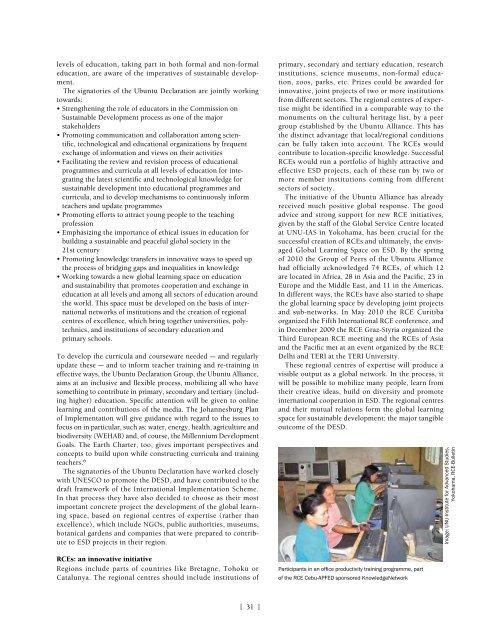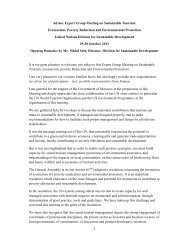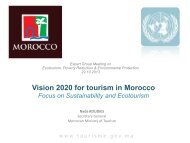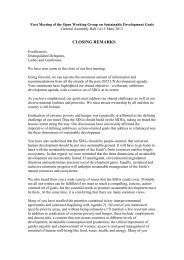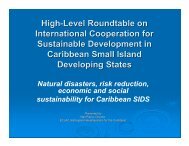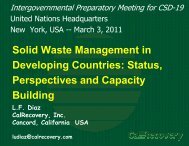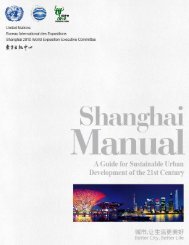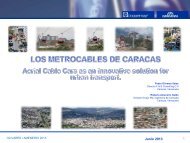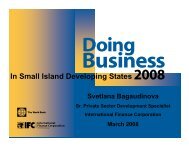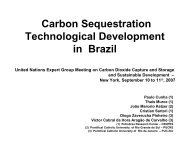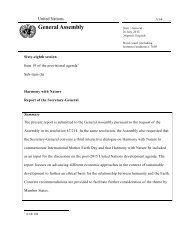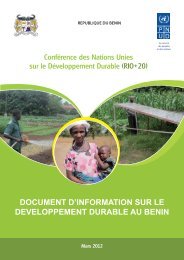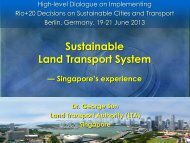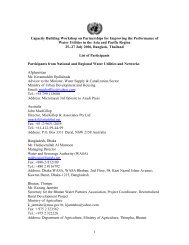Tomorrow today; 2010 - unesdoc - Unesco
Tomorrow today; 2010 - unesdoc - Unesco
Tomorrow today; 2010 - unesdoc - Unesco
Create successful ePaper yourself
Turn your PDF publications into a flip-book with our unique Google optimized e-Paper software.
levels of education, taking part in both formal and non-formal<br />
education, are aware of the imperatives of sustainable development.<br />
The signatories of the Ubuntu Declaration are jointly working<br />
towards:<br />
• Strengthening the role of educators in the Commission on<br />
Sustainable Development process as one of the major<br />
stakeholders<br />
• Promoting communication and collaboration among scientific,<br />
technological and educational organizations by frequent<br />
exchange of information and views on their activities<br />
• Facilitating the review and revision process of educational<br />
programmes and curricula at all levels of education for integrating<br />
the latest scientific and technological knowledge for<br />
sustainable development into educational programmes and<br />
curricula, and to develop mechanisms to continuously inform<br />
teachers and update programmes<br />
• Promoting efforts to attract young people to the teaching<br />
profession<br />
• Emphasizing the importance of ethical issues in education for<br />
building a sustainable and peaceful global society in the<br />
21st century<br />
• Promoting knowledge transfers in innovative ways to speed up<br />
the process of bridging gaps and inequalities in knowledge<br />
• Working towards a new global learning space on education<br />
and sustainability that promotes cooperation and exchange in<br />
education at all levels and among all sectors of education around<br />
the world. This space must be developed on the basis of international<br />
networks of institutions and the creation of regional<br />
centres of excellence, which bring together universities, polytechnics,<br />
and institutions of secondary education and<br />
primary schools.<br />
To develop the curricula and courseware needed – and regularly<br />
update these – and to inform teacher training and re-training in<br />
effective ways, the Ubuntu Declaration Group, the Ubuntu Alliance,<br />
aims at an inclusive and flexible process, mobilizing all who have<br />
something to contribute in primary, secondary and tertiary (including<br />
higher) education. Specific attention will be given to online<br />
learning and contributions of the media. The Johannesburg Plan<br />
of Implementation will give guidance with regard to the issues to<br />
focus on in particular, such as: water, energy, health, agriculture and<br />
biodiversity (WEHAB) and, of course, the Millennium Development<br />
Goals. The Earth Charter, too, gives important perspectives and<br />
concepts to build upon while constructing curricula and training<br />
teachers. 6<br />
The signatories of the Ubuntu Declaration have worked closely<br />
with UNESCO to promote the DESD, and have contributed to the<br />
draft framework of the International Implementation Scheme.<br />
In that process they have also decided to choose as their most<br />
important concrete project the development of the global learning<br />
space, based on regional centres of expertise (rather than<br />
excellence), which include NGOs, public authorities, museums,<br />
botanical gardens and companies that were prepared to contribute<br />
to ESD projects in their region.<br />
RCEs: an innovative initiative<br />
Regions include parts of countries like Bretagne, Tohoku or<br />
Catalunya. The regional centres should include institutions of<br />
primary, secondary and tertiary education, research<br />
institutions, science museums, non-formal education,<br />
zoos, parks, etc. Prizes could be awarded for<br />
innovative, joint projects of two or more institutions<br />
from different sectors. The regional centres of expertise<br />
might be identified in a comparable way to the<br />
monuments on the cultural heritage list, by a peer<br />
group established by the Ubuntu Alliance. This has<br />
the distinct advantage that local/regional conditions<br />
can be fully taken into account. The RCEs would<br />
contribute to location-specific knowledge. Successful<br />
RCEs would run a portfolio of highly attractive and<br />
effective ESD projects, each of these run by two or<br />
more member institutions coming from different<br />
sectors of society.<br />
The initiative of the Ubuntu Alliance has already<br />
received much positive global response. The good<br />
advice and strong support for new RCE initiatives,<br />
given by the staff of the Global Service Centre located<br />
at UNU-IAS in Yokohama, has been crucial for the<br />
successful creation of RCEs and ultimately, the envisaged<br />
Global Learning Space on ESD. By the spring<br />
of <strong>2010</strong> the Group of Peers of the Ubuntu Alliance<br />
had officially acknowledged 74 RCEs, of which 12<br />
are located in Africa, 28 in Asia and the Pacific, 23 in<br />
Europe and the Middle East, and 11 in the Americas.<br />
In different ways, the RCEs have also started to shape<br />
the global learning space by developing joint projects<br />
and sub-networks. In May <strong>2010</strong> the RCE Curitiba<br />
organized the Fifth International RCE conference, and<br />
in December 2009 the RCE Graz-Styria organized the<br />
Third European RCE meeting and the RCEs of Asia<br />
and the Pacific met at an event organized by the RCE<br />
Delhi and TERI at the TERI University.<br />
These regional centres of expertise will produce a<br />
visible output as a global network. In the process, it<br />
will be possible to mobilize many people, learn from<br />
their creative ideas, build on diversity and promote<br />
international cooperation in ESD. The regional centres<br />
and their mutual relations form the global learning<br />
space for sustainable development; the major tangible<br />
outcome of the DESD.<br />
Participants in an office productivity training programme, part<br />
of the RCE Cebu-APFED sponsored KnowledgeNetwork<br />
Image: UNU-Institute for Advanced Studies,<br />
Yokohama, RCE-Bulletin<br />
[ 31 ]


